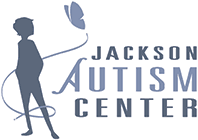Does Jackson Autism Center only work with kids who have autism?
NO! JAC is a center for children who thrive on specialized instruction. Because I taught a classroom for children who have autism spectrum disorders for eight years, my specialties revolved around needs of children who have autism, such as communication and language, social skills, behavior, and play skills. However, those are just some of the areas that can be targeted within an individualized program for your child at JAC. Educational needs such as reading, math, and other skills can be a part of your child’s programming as well.
Is Jackson Autism Center just like other autism centers or services in the state? How is it different?
Jackson Autism Center prides itself on being child-centered. This means your child will not come to JAC and receive the exact same intervention plan as other children. Every intervention plan is specifically designed to meet your child’s needs and not fit into a preplanned formula. What we know about autism is formulas do not work. JAC will work with your child and figure out how he/she best learns and utilize strengths and weaknesses to best meet your child’s needs.
Who are some of the individuals who may benefit from Jackson Autism Center?
Jackson Autism Center is a center that strives to meet the needs of individuals with disabilities throughout the lifespan, from babies and preschool children to school-aged children into adulthood. JAC is designed to meet the needs of individuals with disabilities and their families in Central Mississippi. Some of the disabilities range from Attention Deficit Hyperactivity Disorder (ADHD) to Rett syndrome, Down syndrome, developmentally delayed, and specific learning disabilities. Our goal is to continually push individuals to reach their potential, regardless of disability.
What is autism?
Autism is a disability that affects three specific areas: communication and/or language, social interaction, and behavior. Because autism is a spectrum disorder, all children may not have the same characteristics. Autism is diagnosed by behavioral observation and typically begins to be diagnosed around 2-3 years old. The prevalence of autism has increased dramatically over the past twenty years and is four times more likely in boys than girls.
What are some signs of ASD?
Doesn’t respond to name (by 7 months)
No sharing back and forth smiles, expressions, or sounds (by 9 months)
Atypical eye contact- looking away quickly, looking out the side of their eyes, etc.
*Does not babble or coo by 12 months
*Does not gesture (point, grasp, wave) by 12 months
*No words by 16 months
*Not putting 2 words together by 2 years old independently
*Loss of language or skills (any age)
Atypical attachment to every day items (carries around random household objects)
Toy play that is different or odd, such as lining up trains
*The National Institute of Child Health and Human Development (NICHD) lists these five items as “red flags” and does not mean your child has autism, but further evaluation should be completed.
What does ASD stand for and what is included in ASD?
ASD stands for autism spectrum disorder and ASD covers children diagnosed with autism, Asperger’s syndrome, Rett’s syndrome, Childhood Disintegrative Disorder, and Pervasive Developmental Disorder- Not Otherwise Specified (PDD-NOS).
How can I help my friend or family member who has just received a diagnosis of autism?
Families and friends may process the diagnosis of autism in different ways. The best thing you can do is to be a friend and be there to listen. Give them time to process the diagnosis and ask if there’s anything you can do to help. Being there to listen is one of the best things you can do.
